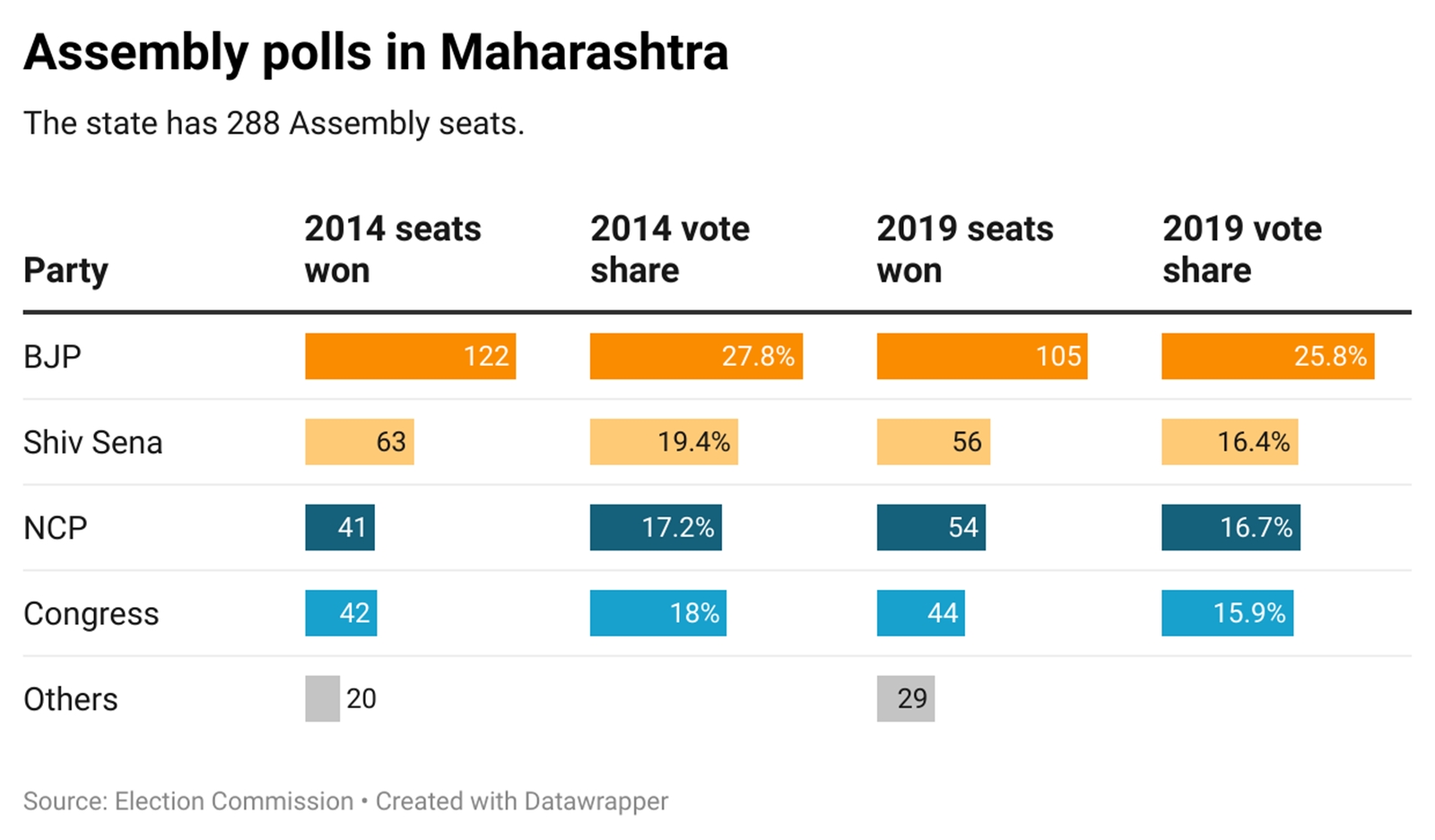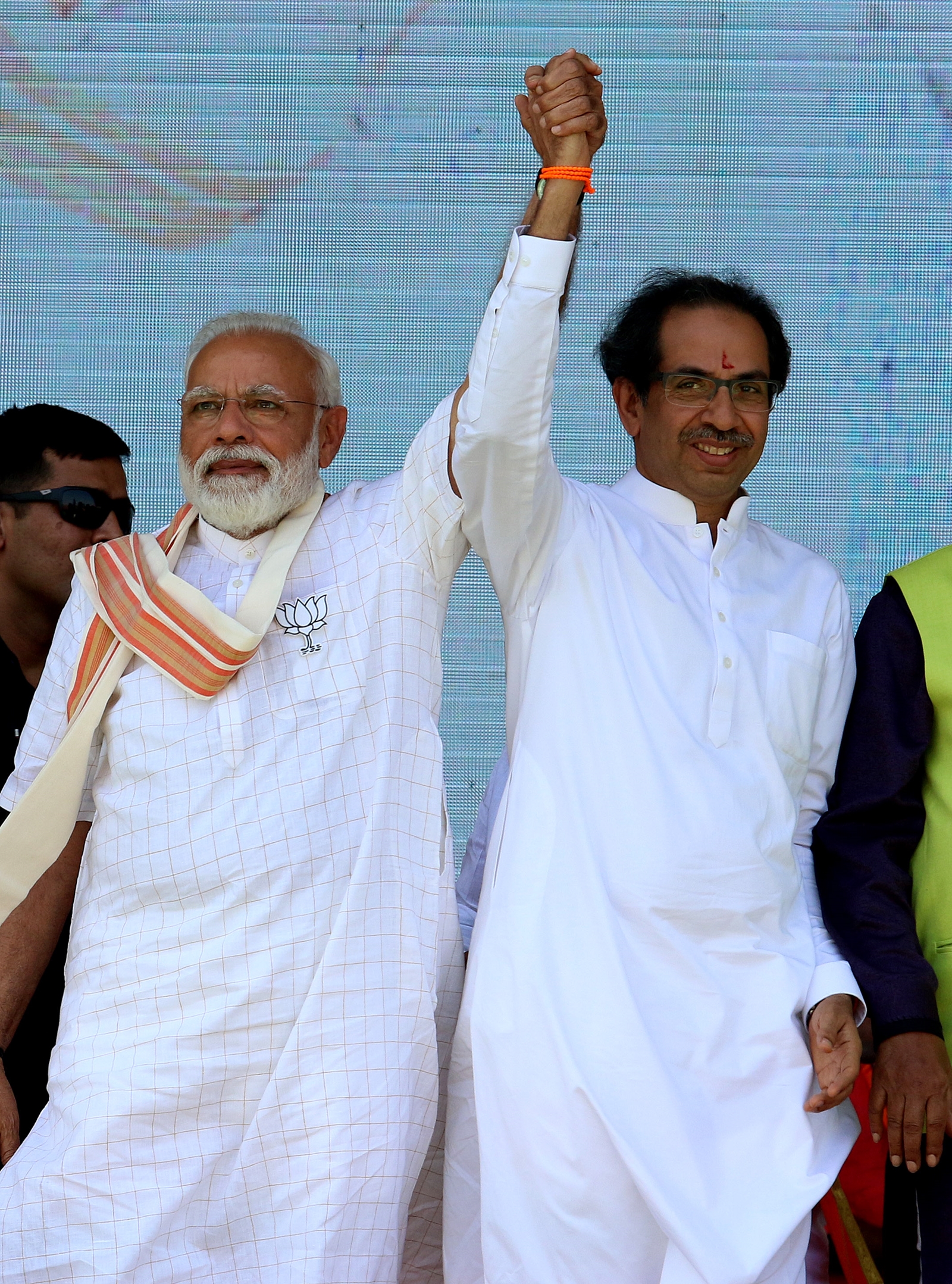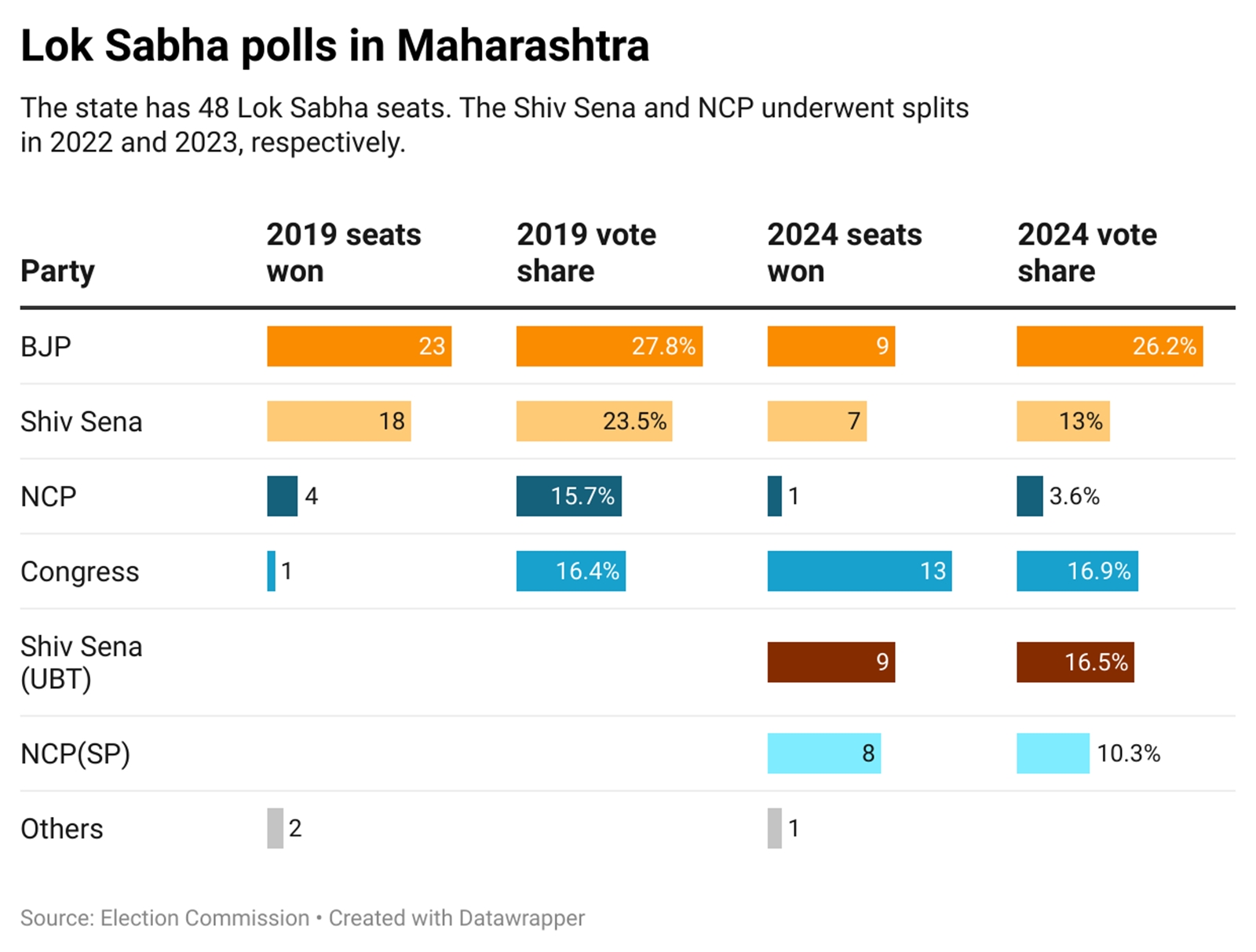The BJP heads into the Maharashtra polls on the back of a record third-consecutive mandate in Haryana. However, the party and its ruling alliance partners Eknath Shinde-led Shiv Sena and Ajit Pawar-led NCP have been in choppy waters in Maharashtra ahead of the elections.
From the competing agitations of the Marathas and Other Backward Class (OBC) outfits over reservation and unrest among soyabean and sugarcane farmers, to the defeat in the recent Lok Sabha polls and rumblings of friction between the alliance partners, the Mahayuti is facing many challenges. The government is also facing criticism on the law and order front, particularly after the killing of NCP leader Baba Siddique, and infrastructural issues.

In the Opposition front of the Maha Vikas Aghadi (MVA), the Congress has been dented by its defeat in Haryana with its bargaining power much weakened as a result when it comes to allies Shiv Sena (UBT) and NCP(SP). However, the MVA’s best hope is its strong performance in the recent Lok Sabha polls.
The 2014 polls
Ahead of the 2014 Assembly elections, the BJP and the then united Shiv Sena had ended their decades-long alliance, as did the Congress and the then undivided NCP after failed seat-sharing talks. In the Modi wave Lok Sabha polls that year, both alliances had been intact, with the NDA emerging as the overwhelming winner with 41 out of 48 seats, with the UPA getting just six seats. But the Assembly polls saw the state’s four major parties contest independently.
 Assembly polls in Maharashtra
Assembly polls in Maharashtra
The BJP was able to repeat its strong Lok Sabha performance – winning 132 Assembly segments – in the ensuing state polls. The BJP won a total of 122 seats, and a 27.81% vote share. Post-poll support from the Sena, which won 63 seats and a 19.35% vote share, took them together past the 145-seat majority mark in the 288-member Assembly, with a government being formed under CM Devendra Fadnavis.
The Congress was the largest Opposition party, with 42 seats and 17.95% vote share, while the NCP was only marginally behind with 41 seats and a 17.24% vote share.
The remaining 20 seats were won by smaller parties and Independents.
The 2019 elections
In the 2019 Lok Sabha polls, the BJP-Shiv Sena and Congress-NCP alliances at the state level carried over into the national elections. The NDA now extended its Lok Sabha tally to 43 seats, with the UPA falling further to five seats. At the Assembly segment level, while the BJP led in 122 segments again, the Shiv Sena led in 105, putting them comfortably clear of the majority mark in the Assembly.
 Prime Minister Narendra Modi and former Maharashtra CM Uddhav Thackeray campaigning ahead of the 2019 Lok Sabha elections. (Express archives)
Prime Minister Narendra Modi and former Maharashtra CM Uddhav Thackeray campaigning ahead of the 2019 Lok Sabha elections. (Express archives)
The NDA and UPA contested the 2019 Assembly polls again together, but this time there was a hung Assembly. The BJP won 105 seats and a 25.75% vote share, followed by the Shiv Sena at 56 seats and 16.41%, the NCP at 54 and 16.71%, and the Congress at 44 and 15.87%.
Smaller parties and Independents won the remaining 29 seats.
After no party was able to win an absolute majority, and the BJP-Shiv Sena alliance collapsed after disagreements over equally sharing the CM’s post, the state was briefly placed under President’s Rule.
Days later, the BJP and a section of the NCP led by Ajit Pawar came together to stake a claim to form the government. However, anticipating that the hastily cobbled together alliance would not be able to prove its strength in a floor test, owing to the reticence of some NCP MLAs, Fadnavis and Ajit Pawar resigned after having taken oaths as the CM and Deputy CM in a rushed midnight ceremony.
The impasse only ended after the Shiv Sena, NCP and Congress formed the MVA and, with adequate numbers, staked a claim to form the government with Uddhav Thackeray at the helm.
The post-2019 polls scenario
The MVA government proved short-lived. In June 2022, Sena leader Eknath Shinde and as many as 40 of the party’s MLAs defected, citing their anger over Thackeray forging the MVA alliance. Amid allegations that the BJP was “engineering defections” in the Shiv Sena to topple the government, then Governor Bhagat Singh Koshyari called for a floor test, after Fadnavis demanded a no-confidence vote against Thackeray. Thackeray unsuccessfully challenged this decision in the Supreme Court and resigned before a trust vote could be held.
Shortly after, Shinde’s Sena and the BJP formed the Mahayuti government with Shinde as the CM.
The tussle between the Sena factions, though, continued in the courts until Assembly Speaker Rahul Narwekar allotted the party’s name and symbol to the Shinde faction earlier this year, forcing Thackeray to rename his faction to Shiv Sena (Uddhav Balasaheb Thackeray). The Supreme Court said that the Governor’s decision to order a floor test was illegal and would have been grounds for the reinstatement of the Thackeray-led government had the former CM not resigned before the floor test.
In July 2023, another party split sent the state into political turmoil. This time, Ajit Pawar broke away from the NCP, taking 40 MLAs as well to join the BJP-led Mahayuti alliance as a Deputy CM. Ajit Pawar had long been at odds with his uncle and NCP supremo Sharad Pawar.
Like with the Shiv Sena split, Ajit’s defection also led to a tussle over the NCP’s name and poll symbol, which was decided in Ajit’s favour earlier this year by the Election Commission. Sharad’s faction subsequently was renamed the NCP (Sharadchandra Pawar).
The 2024 Lok Sabha polls
The results of the recent Lok Sabha polls were a jolt to the ruling alliance, despite what it had done to shore up its numbers. The BJP won just nine of the 28 seats it contested, falling from 23 in 2019, followed by the Shiv Sena at seven of 15, and the NCP at one of four.
 Lok Sabha polls in Maharashtra
Lok Sabha polls in Maharashtra
Agrarian distress in addition to the Maratha agitation and the alienation of Dalit votes over alleged threats to reservation were among the reasons that are believed to have hurt the Mahayuti.
The MVA together won 30 seats, with the Congress emerging as the leading party, winning 13 of the 17 seats it contested. The Shiv Sena (UBT) won nine of the 21 seats it contested while the NCP(SP) won eight of its 10 seats.
What is crucial though is that, in terms of vote share, the alliances were neck-and-neck – the MVA had a marginal advantage at 43.71% compared to 43.55% for the Mahayuti.
Disclaimer: The copyright of this article belongs to the original author. Reposting this article is solely for the purpose of information dissemination and does not constitute any investment advice. If there is any infringement, please contact us immediately. We will make corrections or deletions as necessary. Thank you.
